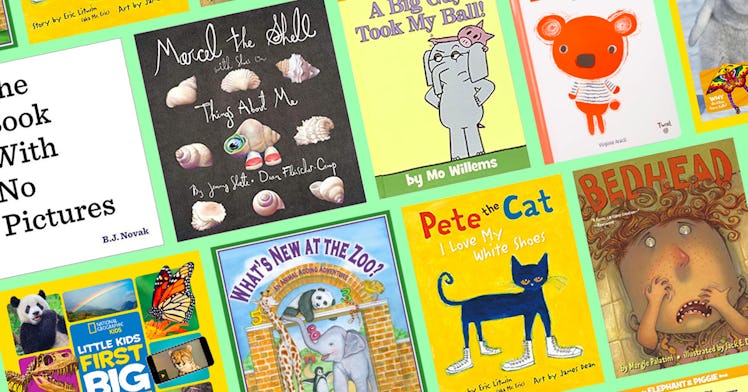The Best Educational Books for Your Coronavirus Homeschool
Good news: You don't need to load up on homeschool workbooks. Kids will learn from books that you love reading together.

No matter how patient you are, how many devices you own, or how creatively you parent, if you’re not a teacher, trying to suddenly run a homeschool during the COVID-19 pandemic is going to come with a learning curve. Considering the circumstances — with the kids bored, parents trying to work without losing their sanity, and everyone stressed— it’s important to be realistic about the limits of impromptu homeschooling and try to approach it in a calm and measured way.
First, a reality check: The good news is, according to numerous early childhood development experts: kids never stop learning, even if they’re not sitting at a desk. And they don’t need a ton of special homeschooling books or elaborate homeschool curriculums.
“Children don’t stop developing just because there’s something major going on in the world,” says Tovah P. Klein, director of the Barnard College Center for Toddler Development. “The best you can do is set up some semblance of structure and let go of expectations.”
Dr. Laura Phillips, a clinical neuropsychologist at the Learning and Development Center at the Child Mind Institute in New York, agrees. Parents, she says, should “cut themselves some slack. This is not a time for us to strive for perfection. It is unrealistic to expect every minute of the day to be filled with enrichment or educational activity, nor should it be. Setting the bar too high will only lead to feelings of failure and disappointment, which are not helpful feelings at this time when you need to stay positive.”
So, instead of implementing a complex homeschool curriculum that you don’t fully understand, or a boring one that will fray your nerves and annoy your children, pick up a book. Any book. It doesn’t have to be an educational book in the traditional sense. For kids, all books are educational. If it has words in it, you’re winning homeschool already.
“Read the books kids love for reassurance. I’m not a big person for workbooks. They’re repetitive but are good for practice. They should be one piece of the learning puzzle. You don’t want to be didactic. I’m a big person for storybooks. It’s something parents and kids can do together and it’s more authentic,” says Margo T. Pensavalle, a professor of clinical education at the USC Rossier School of Education.
If your kids are too young to read on their own, “read together,” says Pensavalle. “Have your kid write a story about someone in that book, or dictate the story to parents. Have them sing a song about it. Have them draw a picture about it. If you make it too hard and boring, kids will check out. Period.” These are some of the best educational children’s books, including classics and newer ones, for toddlers, preschoolers, first-graders, and beyond, to incorporate into your homeschooling routine.
Educational Books for Toddlers
For toddlers, “parents should not worry about learning goals,” says Klein. “It’s not how many letters kids will learn in a day or how many math problems they do. They will learn and develop through this all. Choose books that are your children love and that are comforting to them. If reading becomes a boring task or the parents feel pressured, it won’t work. Children like going back to their favorite books — it gives them comfort.”
Educational Books for Preschoolers
“Reading aloud is the single best thing that you can do for your child to maximize his or her chances of successful reading acquisition and to promote their love of reading,” says Phillips. “It is a great way for you and your child to spend time together and bring down stress levels, as well. You want to help boost their phonemic awareness (i.e., the ability to identify and manipulate the phonemes in words), so reading books that emphasize rhyme and alliteration is particularly important.”
Educational Books for First Graders
“Emphasis at this age is placed on developing early literacy skills, including phonemic awareness, phonic decoding, and sight-word reading,” says Phillips. “To help with reading comprehension, ask questions such as, ‘What do you think will happen next?’ while reading aloud to your child.”
Educational Books for Second-Graders
“As word reading develops and improves, instructional emphasis shifts to reading fluency, which is critical for comprehension,” says Phillips. “Try to boost your child’s reading fluency by reading books out loud at the same time and seeing if they can try to match your pace. This will help them get used to what fluent reading feels and sounds like. Choose books that your child can read independently so that they can focus instead on pacing, rather than decoding.”
Every product on Fatherly is independently selected by our editors, writers, and experts. If you click a link on our site and buy something, we may earn an affiliate commission.
This article was originally published on